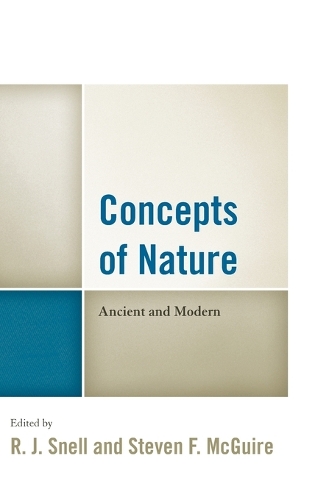
Concepts of Nature: Ancient and Modern
(Hardback)
Available Formats
Publishing Details
Concepts of Nature: Ancient and Modern
By (Author) R. J. Snell
Edited by Steven F. McGuire
Contributions by Barry Cooper
Contributions by Thomas W. Smith
Contributions by Glenn Hughes
Contributions by Melissa Moschella
Contributions by Jeremy Seth Geddert
Contributions by Jesse Covington
Contributions by James R. Stoner
Contributions by Christopher O. Tollefsen
Bloomsbury Publishing PLC
Lexington Books
7th October 2016
United States
Classifications
Tertiary Education
Non Fiction
Social and political philosophy
113
Physical Properties
Hardback
250
Width 160mm, Height 239mm, Spine 24mm
522g
Description
If natural law arguments struggle to gain traction in contemporary moral and political discourse, could it be because we moderns do not share the understanding of nature on which that language was developed Building on the work of important thinkers of the last half-century, including Leo Strauss, Eric Voegelin, John Finnis, and Bernard Lonergan, the essays in Concepts of Nature compare and contrast classical, medieval, and modern conceptions of nature in order to better understand how and why the concept of nature no longer seems to provide a limit or standard for human action. These essays also evaluate whether a rearticulation of pre-modern ideas (or perhaps a reconciliation or reconstitution on modern terms) is desirable and/or possible. Edited by R. J. Snell and Steven F. McGuire, this book will be of interest to intellectual historians, political theorists, theologians, and philosophers.
Reviews
With this collection, philosopher R. J. Snell and political scientist Steven McGuire (both Eastern Univ.) investigate the differing conceptions of nature found in the Western philosophical tradition as a means of determining whether human nature can still serve as an effective standard for moral and political discourse. From its beginnings in classical philosophy to the Enlightenment, Western thought has been preoccupied with the idea of nature and its relation to human action. Though there is some reference to the medieval Christian contribution, most of the essays concentrate on the profound conflict between the ancients and the moderns on this issue. Because this was a central theme in the writings of Leo Strauss and Eric Voegelin, two masters of 20th-century political theory, it is not surprising that several essays reflect their influence. The collection also includes essays on some unfamiliar voices: there is a study of Louis Duprs treatment of modernity, an analysis of the idea of progress in H. G. Wellss fiction, and an examination of secularism and the God question in the philosophy of Bernard Lonergan. This collection will provide more questions than answers, but the contributors should be applauded for asking the right questions. Summing Up: Recommended. Graduate students, researchers, faculty. * CHOICE *
[This book] is a fine example of Voegelin scholars engaging with a range of academic voices, and on a perennial topic of crucial philosophical and historical importance. * VoegelinView *
This diverse and compelling collection of essays is unfashionably oriented around the truth. Is the modern understanding of nature really true Can the premodernespecially classicalviews of naturebe shown to have been displaced for inadequate reasons and so can become relevant alernatives for us Can we return, in truth, to the primary experience of the cosmos that, say, Eric Voegelin finds in classical thought If Aristotle's thought remains plausible, can be we return to his understanding of natureOr can we reappropriate his idea of practical reason while retaining the modern distinction between nature and human freedom This excellent volume makes these questions real points of controversy for us today, displayingthe kind of engagement that animates men and women convinced that the truth about nature really matters. -- Peter Augustine Lawler, Berry College
For modern human beings who are lost in the cosmos, the symbol nature is almost meaningless if not suspicious because it seems to undercut their sense of freedom and to place false and arbitrary limits on the scope of their technological pursuits.The contributors to this volume clarify what is at stake with the experience and symbol nature at a time when humanitys place within it is at its greatest peril. Their efforts demonstrate its contemporary significance for ethical and political thinking. -- John von Heyking, University of Lethbridge
Author Bio
R. J. Snell is professor of philosophy at Eastern University and executive director of the Agora Institute for Civic Virtue and the Common Good. Steven F. McGuire is assistant professor of political science at Eastern University and a research director at the Agora Institute for Civic Virtue and the Common Good.
